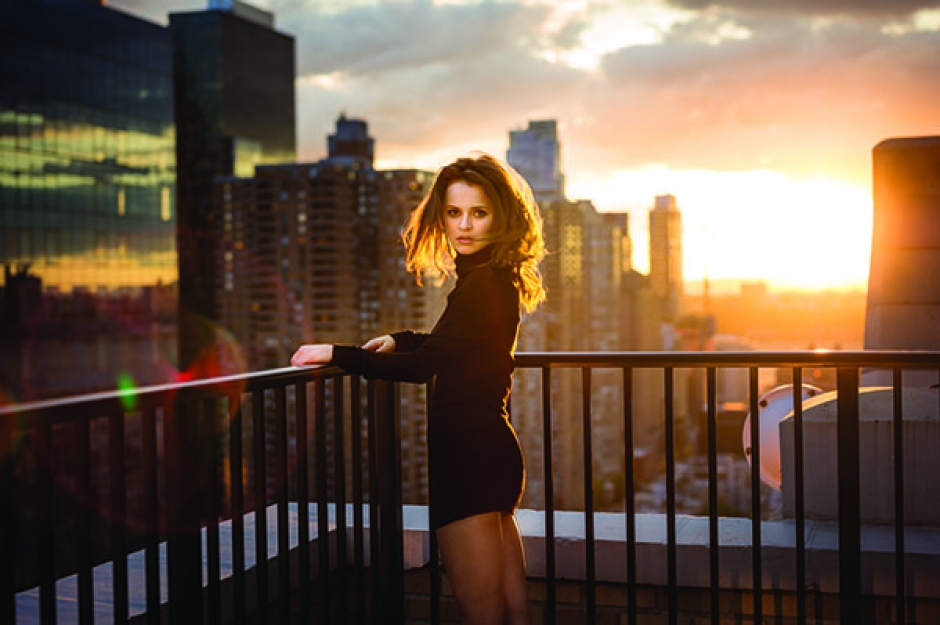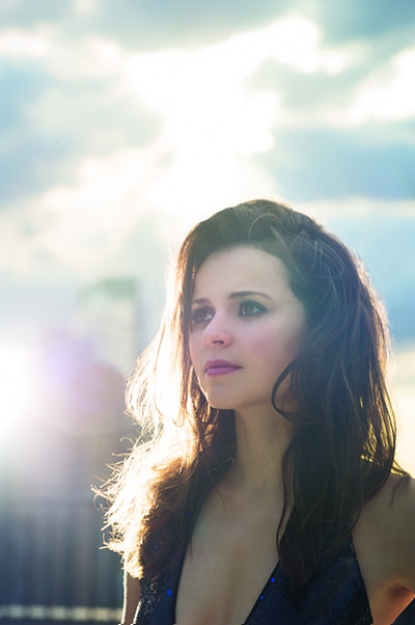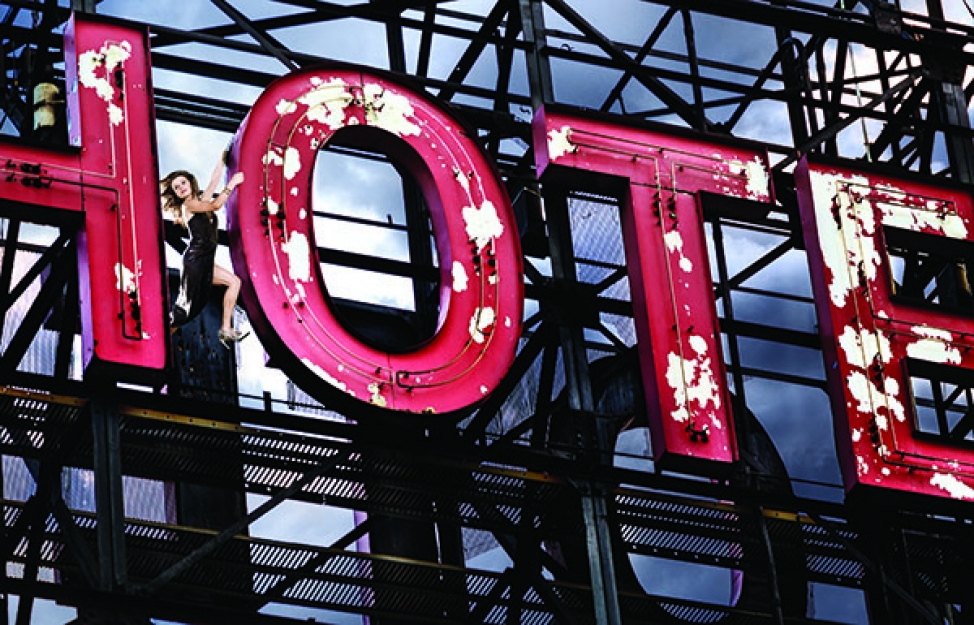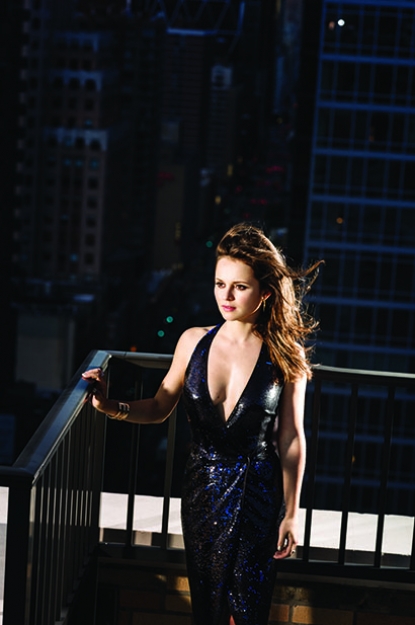How did you grow up in southern California and become a figure skating champion?
It’s funny. There are actually a lot of training centers there. It’s also where Michelle Kwan grew up skating. I think it’s because there are a lot of amazing coaches there.
What got you started in skating?
I actually did gymnastics first, and one of the girls that I trained with also skated. She took me to the rink, and I absolutely feel in love with the feel of gliding. I felt like I was flying. I had no coordination and fell all over my self, but I fell in love. I did both for a little while, and then my mom said there weren’t enough hours in a day to take me to gymnastics and to the rink, so I chose skating.
At what point did it get serious for you?
When I was about 11 years old. I was going to public school, and I would skate really early in the morning or late in the afternoon, and the sessions were so crowded. I couldn’t get my music on; I couldn’t get lessons. Every time I would go for a jump, someone was in my way. I was frustrated because I knew I wasn’t improving. I couldn’t get to where I wanted to be if I couldn’t have optimum ice time and have access to the best coaches. I went to my first day of school in 7th grade and said, “Mom, I can’t do this. I need to be home-schooled. I need to be at the rink all day.” I think she recognized that this was everything to me.
And that’s a tough choice for a parent. To take your child out of school for a sport, it’s an extraordinary sign of support.
It’s not for everyone, and the southern California public school system wasn’t preparing me for the real world either. It wasn’t like I was going to a prep school where I was giving up a great education to pursue a dream of sports.
At what point in your career did you feel like the Olympics was an attainable dream?
I think I was pretty confident as a kid. As soon as I had a concept of what the Olympics were, I was going to the Olympics. I don’t think I ever thought about what the odds were or how few people get to go. Even the year before, I was injured with a really bad back injury and had to be off the ice for three months, I wasn’t on the world team. And I really had no doubt in my mind that I was going to go to the Olympics. Maybe it’s that youthful confidence, that naïve nature that you feel like anything is possible. I think that when you get older, you kind of realize that humans are fallible. That everything doesn’t always go perfectly. People get injured. There are nerves. There is pressure. But I don’t think I felt any of that until later in my career.
Was it hard for your parents to see their teenage girl dealing with injury after injury?
Yeah, I have 21 stitches. Someone landed a jump in my leg here (points to calf). I’ve slid through light bulbs. I have all these scars. I had a broken hip, back. I have a torn meniscus. I’ve broken just about everything. But I was lucky. My family wasn’t pinning their life on my career. And my mom ended up being my rock. She drove me to the rink, the doctor, Pilates, skating. We would spend two hours a day in the car when we were going to these places, and I think when I was injured, it impacted her more because it was her life too. But she was incredibly supportive. We always had a sense of balance, which helps through times when you have to take a month off because you broke something.
To me, the most amazing thing about being an elite figure skater is that the work required is so great, and yet the window to succeed is so small.
You don’t realize that when you are so young. I definitely realized that going into my second Olympics. But when you’re a teenager, you’re not putting equations on how much work you put in and the chance you have to really cash in on your work. It’s a dream; you’re compelled to do it. It makes life incredibly simple, because you know who you are and what you are meant to do. And now, I think it’s something that I struggle with, and a lot of other athletes struggle with. After your athletic career is over, you try to find it again because you didn’t question it. You woke up every day and trained. It was incredibly difficult, but when you pushed yourself, you got over your insecurities, your doubts, your injuries, and you had this feeling of being on top of the world. That’s what I got use to living for. Your biggest competition is yourself and how you feel and your thoughts. I lived my life in a bubble. I was very secluded from the world. It was “Will I beat myself today? Am I going to give in because I don’t feel great? What am I going to pull out of myself?” So it’s a different way to live. Moving to New York City and going to school at Columbia and meeting new people, it’s like learning how to live all over again
After your second Olympics, at age 21, did you know at the time that this was it for skating?
I thought that my goal was to win, and to tour, and to have this glamorous shiny medal the rest of my life. And I thought I was done, but I wasn’t sure, so I toured for a while longer. I decided at 24 that I would train and come back for Nationals when I was 25, but it was so challenging. At 25, your body is very different, and you are training with 12 year olds. You test yourself in a different way—your head is different, your body is different, and I was going back to do this for a third time. I ultimately didn’t make it, but it was one of my happiest and most fulfilling years.
We’ve heard that from several Olympic athletes.
Because you wake up with this purpose. You miss it. You tour, and you don’t have a chance to think, because you’re busy. They’re telling you, “Go to this shoot; do this show.” But after a while, you’re like “Why?” It makes sense for work, but there is no meaning behind it. It doesn’t really matter what happens, and you miss the purpose and the reason. It’s the only way we know how to live with this extreme intensity—these amazing highs and shattering lows— and we are not use to just living and being okay. Touring was great, but it was a little flat. You miss the agony and the elation of competition.
How did the experiences compare, competing to make three different Olympic Games?
My first Olympics was like Disneyland. There were athletes from all over the world, all different sports, and my jaw was just dropping the whole time. The second Olympics, it was about the pressure, expectations and dealing with injuries. It was very nerve racking. The last time, it was the last time I’m ever going to do this, and it’s been an incredibly difficult career, and it’s incredibly rewarding. You have this sense of appreciation getting a standing ovation from your fans that have followed you since you were 15. They have that devotion to you, and what you’re doing. It’s not just this naïve wonder, it’s a sense of how incredible it is what you’re doing to be an Olympic athlete—to take this piece of music and transform it, put your heart and soul into it, and sacrifice years of your life to give something. You see it much more from that angle, and you interpret the success and the pain and the loss in a different way, which makes it a lot more meaningful. It wasn’t the way I wanted it to end, but I closed a chapter, and I didn’t regret going back because it gave me so much meaning that I had been searching for, and then I had to find it again. If I’m not going to do this anymore, if I’m not getting fulfillment out of touring, I ultimately needed to move to a different city. I needed to find a different dynamic of people to surround myself with and develop myself in another way
You didn’t want to be defined by the Olympics as a person.
Yeah, and I don’t want to ever look back in my life and say the best thing I ever did in my life was when I was 21. And I don’t want to meet people when I am 50 and be like, “You know I won an Olympic medal when I was 21, and let me tell you…”
So what made you decide to go to Columbia?
Intellectually, I was dying. There was no stimulus. I didn’t have a vibrant intellectual community. My life was work out, hang out with the same few people, do a show, and it turned on me. I wasn’t happy. I would spend my days off touring the library. It was time to go to school. And it was a scary decision to move to New York. I didn’t know anyone, and I hadn’t been to school since 7th grade. I basically had eight years of no school at all between high school and going to Columbia, and it was intimidating. I am in school now with people who have been on an academic track since they were seven years old.
Had you thought about a career after school?
I didn’t have exposure to very much, so I didn’t have a chance to develop any of my interests. I like business and finance because it is competitive the way sports was, so I moved to New York thinking that I wanted to run a hedge fund. Coming to New York and going to school and getting exposure to the process, I’ve realized that it isn’t what I want to do. But it has been amazing to explore that. I love the intellectual rigor of investing and having a thesis of a company and not being afraid to stand against the crowd. But I realize that I have a huge creative side, and I have so many interests that I haven’t explored that I am not ready to decide what I want yet
That is a healthy way to look at it, because I would imagine that when you have accomplished what you have accomplished at an early age, there must be a social pressure to jump into something else amazing.
There is, and I think most of that pressure came from myself. I think I have learned to cultivate a bigger respect towards my life as a whole. I’m listening to the things that make me happy and realizing that I’ve given up the first part of my life as a career. I need to develop myself as a person before developing a second career. And it’s hard, because I feel guilty taking art and philosophy classes. I feel a sense of guilt of not making the sacrifice and picking the competitive difficult path that leads you to the highest peg.
What has been the most difficult aspect of going back to school at Columbia University?
I think I had the hardest time adjusting to an academic lifestyle. I never have been good at sitting still in my life. Sitting through four classes, I was like, “Great, I’m done! Now I can go to yoga.” But I wasn’t done, because then I had to write a paper or do reading. But I’m really happy with the stimulation and the challenge even though sometimes I resent it. Do I really have to write a 15-page paper? But then you see who you are on the other side of that paper, and how it forced you to think critically and compose your thoughts. Then you’re very grateful again. I’m going through that right now at Morgan Stanley where I have been working recently. I had to put together a big presentation, and I was having a good time researching and reading the articles about different investment processes and companies that can have a big global impact in five to 10 years on a global level. And I love it, because it’s macro, it’s theoretical. But then to be forced to go through the minutia of balance sheets and P and L statements and you resent it. Your mind rebels, but through the structure you learn a lot, and you wouldn’t make yourself do it otherwise, so its like I’m learning to accept the things that I am not good at and things I’ve never done before with an open mind. It’s very hard to accept that something you were good at, and then you were great at, then your body starts to go. You realize that if you keep doing it, you are going to get worse and worse every year. It’s going to get harder and harder, and it is not how you want to feel when you are in your twenties.
Is there another dream?
The dream I had was to run a hedge fund. I looked up to people like Bill Ackman and Warren Buffett. I thought it was incredible what they have created and the bets that they placed on their career. As I get older, the traits I really admire are intellect, ambition and dedication. I feel like those are the values in sports, and they really translated into finance because you need to work incredibly hard and be very smart and competitive to do well. But now I know I love to paint, and I have dreams of doing something artistic. Maybe I’ll start a company of my own and build a brand. I don’t know what sector that will be in, but hopefully in the next year I will figure it out.
And for now?
I am in a really great place. The things you go through that are incredibly difficult define you. So for me, whether that was not winning an Olympic medal, or moving to New York and not knowing anyone, or going to school after I hadn’t done that in so long. Or going through a very difficult break-up with someone I thought I was going to marry, these things end up shaping you for the better. It’s like they say when making wine, the best grapes grow on the rockiest soil.





